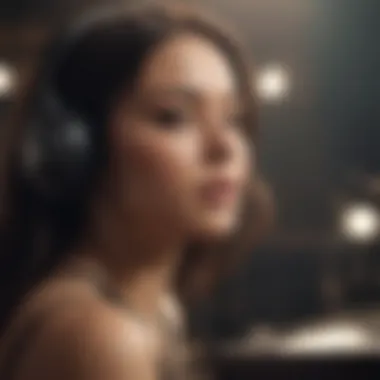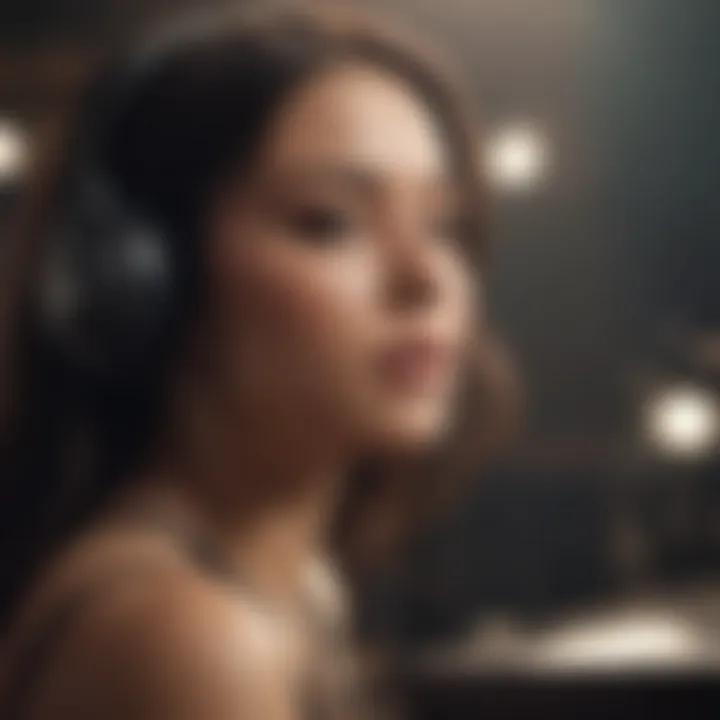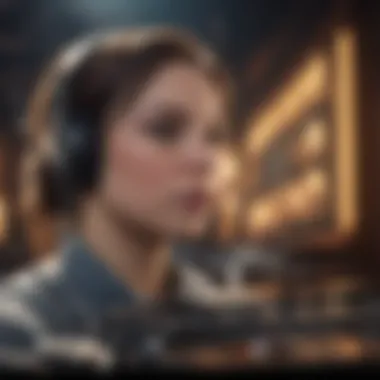Exploring the Essence of 'All Things Go' in Music


Intro
The phrase 'All Things Go' holds a significant place in music, resonating through various genres and eras. It captures the transient nature of life and creativity, a theme that musicians explore continuously. Understanding this concept requires an examination of its cultural significance, historical context, and the ways in which it influences both artists and listeners.
Historically, 'All Things Go' connects back to various philosophical ideas about change and impermanence. This understanding shapes how audiences relate to music. Many artists use the phrase to convey their experiences, struggles, and reflections on society. By digging deeper into this concept, we can uncover a profound appreciation for the evolution of musical expression.
In this article, we will dive into the essence of 'All Things Go', exploring artist profiles, song analyses, and cultural implications. We aim to provide an enriching perspective that resonates with music enthusiasts and aspiring musicians alike.
Artist Profile
Biography and Background
Exploring the essence of 'All Things Go' often leads us to examine specific artists who exemplify this theme. Many musicians have crafted works that reflect the underlying message of acceptance and change. To illustrate this, we can consider the career of Sufjan Stevens, whose poignant storytelling encapsulates the fragility of life and the inevitability of transition. Stevens grew up in Michigan and began making music in the early 2000s, bringing together an eclectic mix of folk, classical, and pop elements. His ability to weave personal narratives with broader social commentary makes him a suitable representative of this theme.
Major Influences and Inspirations
Sufjan Stevens draws inspiration from a variety of sources in his work. These influences range from his Midwestern upbringing to literature and visual arts. He often cites artists like Bruce Springsteen and the electronic music of the late 90s as having shaped his artistic direction. Stevens’ lyrics are rich in emotional depth, often exploring themes of loss, identity, and spirituality. These aspects align perfectly with the concept of 'All Things Go', reflecting the complexities of human experience.
Song Analysis
Theme and Lyrics Breakdown
In analyzing songs that capture the notion of 'All Things Go', we can examine "Death with Dignity" by Sufjan Stevens. The song delves into themes of mourning and acceptance, exploring the death of his estranged mother. Lyrics such as "I was very small, when I touched my leg" touch upon the fragility of memories and the inevitability of loss.
This track embodies the essence of embracing change and understanding life's fleeting moments. Listeners are invited to reflect on their own experiences, creating a shared emotional journey.
Instrumentation and Composition
The instrumentation of "Death with Dignity" combines gentle piano melodies with orchestral elements, establishing an atmosphere of introspection. The minimalist approach in the arrangement allows the lyrics to take center stage. The use of strings adds warmth while underscoring the somber themes present in the song. Such a composition mirrors the subtlety of life, where intricate emotions often lie beneath the surface.
This careful construction of sound aligns with the broader interpretation of 'All Things Go', showing how music can express complex feelings in a profound and relatable way.
Understanding the Phrase 'All Things Go'
The phrase 'All Things Go' holds a profound significance in the realm of music. This article endeavors to unravel its depth by exploring various dimensions. Understanding this phrase helps in comprehending the ever-evolving nature of music and its connection to different aspects of culture, identity, and artistic expression. Here, we will delve into its origin and usage, cultural implications, and notable literary references.
Origin and Usage
The origin of the phrase can be traced back to ancient philosophical concepts. It suggests a transient nature of life and experience, worthy of reflection in music. Over time, it has found a notable place in various musical works. Artists have utilized it to express themes of change, continuity, and even loss. In songs, 'All Things Go' encapsulates a wide range of emotional responses, from nostalgia to hope. This usage highlights its versatility and relevance across genres.
Cultural Implications
Culturally, 'All Things Go' resonates with the dynamics of modern life. It ties into the collective consciousness of listeners who navigate life's ups and downs. The phrase often evokes thoughts about mortality, change, and the passage of time. Music that embraces this theme allows listeners to process their experiences, making it a vital part of emotional understanding. The enduring nature of this concept facilitates a connection between different generations and cultural backgrounds, emphasizing shared human experiences.
Literary References
Literary works often parallel the themes presented in music. The phrase has appeared in poems, novels, and essays, highlighting its relevance over centuries. Poets and writers have explored similar ideas of impermanence and transformation. Such references infuse music with a rich tapestry of meaning, where lyrics and narratives intertwine. Recognizing these literary links can enrich listeners’ understanding of songs, revealing deeper interpretations of the human condition, as articulated by both musicians and writers.
"The essence of 'All Things Go' in music reflects the broader truths of existence, capturing both the fleeting and lasting qualities of our experiences."
This comprehensive overview of the phrase establishes a foundation for further exploration into its thematic analysis within music, revealing the complexity underlying what may seem like a simple utterance.


Thematic Analysis in Music
The theme of a song serves as a fundamental aspect in understanding not just the music itself, but also the cultural and emotional narratives it communicates. In the context of 'All Things Go,' thematic analysis becomes crucial in dissecting how musicians convey the complexities of life through their art. This aspect can help listeners to relate to their experiences while providing depth to the artist's expression.
Common Themes Associated with 'All Things Go'
When delving into songs that embody the sentiment of 'All Things Go,' it becomes clear that certain themes recur with notable consistency. These themes may include:
- Transience and Change: Many songs portray a sense of ephemeral beauty, highlighting the inevitability of change and loss. This resonates deeply with listeners as it reflects real-life experiences.
- Identity and Self-Reflection: Artists often use their music as a medium for introspection, examining identity in relation to past experiences and societal norms.
- Hope and Resilience: Despite themes of loss, there is often an undercurrent of hope, suggesting that while all things may go, there is a potential for renewal and growth.
These themes not only connect songs to each other but also to broader human experiences, making the concept of 'All Things Go' relevant across different contexts.
Narrative Devices in Songwriting
In analyzing how artists interpret 'All Things Go,' it is important to recognize the narrative devices they use.
- Storytelling: Many songs adopt a narrative structure, where the lyrics unfold like a story. This can evoke emotional responses, drawing listeners into the journey the artist presents.
- Imagery: By using vivid descriptions, songwriters effectively paint pictures that evoke feelings and thoughts related to the themes of existence and change.
- First-Person Perspective: This technique invites listeners into the intimate world of the artist, fostering a connection between the creator and the audience.
The effective use of these narrative devices amplifies the impact of the underlying themes, making them more accessible and relatable to listeners.
Symbolism in Lyrics and Titles
Symbols play a significant role in the interpretation of songs connected to 'All Things Go.' Artists use various symbols to deepen the message of their music.
- Nature References: Elements like seasons, day and night, often symbolize cycles of life and change. These can evoke a sense of universality in the experience of life.
- Objects and Places: The mention of certain objects or locations often carries personal significance, creating a bridge between the artist's reality and that of the listener.
- Colors and Emotions: The use of color symbolism can convey specific feelings that link back to the overall message of transitory experiences.
Each symbol, carefully chosen by the artists, adds layers of meaning, enriching the overall thematic tapestry.
Understanding these thematic and symbolic elements allows for a deeper appreciation of music as a reflection of life's complexities—all of which highlight the ongoing narrative captured by 'All Things Go.'
In summary, thematic analysis in music provides critical insight into how songs reflect and shape individual and collective experiences. It encourages listeners to engage in a thoughtful exploration of music and its many dimensions.
Case Studies of Iconic Songs
Understanding the case studies of specific songs is crucial in comprehending the essence of 'All Things Go'. These case studies provide insights into how different artists express this overarching theme through their unique lenses. By closely examining songs, we reveal not just the lyrical content but the context, emotion, and cultural backdrop that inform their creation.
Moreover, analyzing these songs helps to articulate the various meanings and resonances of the phrase 'All Things Go'. It illustrates the diverse ways artists grapple with themes of impermanence, change, and the transient nature of existence. Each song reflects personal and collective experiences, showing how music becomes a site for exploring significant themes.
Song Analysis: 'All Things Go' by Chvrches
Chvrches' song "All Things Go" serves as a poignant example of the phrase's deep emotional resonance. The lyrics weave a narrative that speaks directly to loss and the passage of time. The song captures a sentiment that reflects both personal sorrow and universal existential questions.
Musically, the arrangement employs a blend of synth-pop elements that enhance its emotional weight. The euphoric and melancholic tones create a feeling of duality—where joy and sadness exist side by side. The song's refrain emphasizes the inevitability of change, resonating strongly with listeners.
In summary, Chvrches embodies the essence of 'All Things Go' by intertwining poignant lyrics with an evocative musical landscape, reflecting both personal and collective experiences.
Influence of 'All Things Go' Across Genres
The influence of the concept 'All Things Go' extends beyond a single genre, permeating various musical styles. In pop music, it often appears as a motif in songs that deal with youth, fleeting love, and the pressures of fame. Artists like Taylor Swift and Ed Sheeran use this theme to explore life stages and relational dynamics.
In rock music, bands such as Radiohead emphasize themes of existential dread and social commentary, creating an atmosphere where 'All Things Go' manifests as reflections on societal change. Even in hip-hop, artists like Kendrick Lamar engage with this notion by addressing personal struggles and broader social issues, emphasizing resilience in the face of impermanence.


Such influence highlights the adaptability of the phrase across genres. Each genre brings its texture and nuance, providing listeners with varying interpretations. This cross-genre presence showcases the multifaceted reception of the phrase 'All Things Go' and its relevance in contemporary music.
Comparative Analysis of Similar Concepts
Examining similar concepts that resonate with 'All Things Go' allows for a nuanced understanding of its musical implications. For example, themes of nostalgia commonly appear in artists’ works, exploring recollections that are often bittersweet. Songs like "Summer of '69" by Bryan Adams or "Good Riddance (Time of Your Life)" by Green Day reflect on moments passed, acknowledging that while the memories persist, time continues to move forward.
Another comparable concept is the exploration of mortality and legacy, seen in songs like "Tears in Heaven" by Eric Clapton. Here, artists confront the inevitabilities of life, providing listeners with a channel to process their thoughts on loss and remembrance.
By comparing these ideas, it becomes evident that ‘All Things Go’ encompasses broader themes of change, memory, and the human experience. Each concept invites listeners to reflect deeply on their journeys, revealing a shared narrative that transcends individual experiences.
The Impact on Artists
The phrase 'All Things Go' serves as a poignant reflection on the relationship between musicians and their craft. It touches on the core of artistic expression, the influence of personal narratives, and the intricate bond between the artist and the audience. As explored in this article, understanding this impact is crucial for a comprehensive grasp of the music landscape. Through the lens of 'All Things Go', we observe how artists navigate their creative journeys, making choices that not only define their music but also shape cultural conversations.
Artistic Expression and Autonomy
Artists thrive on creative autonomy, and the concept of 'All Things Go' embodies this idea. It instills a sense of freedom, pushing musicians to explore their unique voices. Music becomes a medium to express complexity, vulnerability, and personal truths. In a world where marketability often dictates artistic directions, embracing 'All Things Go' becomes a form of resistance. Musicians can challenge expectations, redefine genres, and authentically express themselves.
The significance of autonomy in music is profound. Artists have directed their energies towards communicating emotions and sharing experiences. This creates a connection with listeners and allows them access to distinct perspectives. Their songs can touch on universal themes, while still remaining deeply personal. Thus, by asserting their independence, musicians contribute to a larger dialogue about identity, representation, and the nature of artistic ambition.
The Role of Personal Experience
Personal experiences are the bedrock of many musical compositions. The adage 'all things go' situates each artist's journey within a wider human experience. This theme enables artists to draw from their distinct life stories, shaping their sound and lyrical content. It acknowledges the inevitability of change and the passage of time, both essential elements in personal growth and artistic evolution.
Many notable musicians have turned to their personal narratives as sources of inspiration. For instance, acclaimed artist Mitski has explored themes of heartache and identity in her work, drawing from her own experiences to create a resonant body of music. When artists share their vulnerabilities, listeners often find solace or reflection in their artistry. This intimate connection reinforces the power of music as a medium for storytelling.
Understanding Audience Reception
The reception of music is equally vital in the context of 'All Things Go'. It reflects how listeners interpret and relate to the themes present in the artist's work. As artists convey their journeys, audiences increasingly connect through shared experiences and emotions. They find meaning in the lyrics, melodies, and the overall narrative that resonates with their own lives.
The connection goes both ways. Artists often respond to audience feedback, allowing for an evolving relationship. Positive reception can inspire musicians to push boundaries, while criticisms can lead to introspection and growth. Thus, this dynamic relationship between artists and audiences shapes the music industry and promotes a continuous cycle of innovation and creativity.
"Art cannot be separated from the life experiences of the artist, nor the lives of the listeners."
The interplay of artistic expression, personal experience, and audience reception solidifies the essence of 'All Things Go'. Through this understanding, we see how integral these aspects are to shaping not only individual artist trajectories but the broader musical landscape.
Exploration of Genre-Specific Interpretations
The concept of 'All Things Go' resonates differently within various music genres. It is essential to explore these genre-specific interpretations, as they reveal the unique ways in which artists convey themes of change, loss, and the passage of time. Each genre offers a distinct lens through which this phrase can be appreciated, deepening our understanding of both music and culture. This exploration not only enhances our appreciation of the music but also highlights the ways artists connect with their audience through shared experiences.
Pop Interpretations of 'All Things Go'
In the pop genre, 'All Things Go' often embodies a sense of optimism despite chaotic circumstances. Artists like Chvrches in their song "All Things Go" encapsulate poignant narratives through catchy melodies and relatable lyrics. The fusion of accessibility and depth in pop music allows listeners to reflect on transition and resilience. This thematic exploration allows first-time listeners to engage easily with the content while inviting deeper reflections on their own lives.
Pop songs come equipped with memorable hooks, making the exploration of 'All Things Go' particularly engaging. Common threads in pop include themes of personal growth and the bittersweet nature of change.
Rock and Alternative Contexts
Rock and alternative music frequently approach 'All Things Go' with a more introspective mindset. Here, the phrase may reflect disillusionment or the struggles inherent in the search for authenticity. Artists like Radiohead have sculpted their narratives around existential themes, leading to music that is both raw and thought-provoking.
In these genres, the exploration often manifests through intense instrumentation and strong emotional vocal delivery. Lyrics might delve into concepts such as the impermanence of life, pushing listeners to confront hard realities. The rebellious spirit prevalent in rock amplifies these themes, encouraging a deeper connection to the music and a more personal interpretation of its message.


Hip-Hop Perspectives
In hip-hop, 'All Things Go' often captures themes of survival, ambition, and social commentary. Artists such as Kendrick Lamar infuse their tracks with reflections on personal struggles and societal challenges. The phrase resonates as a reminder of both resilience and the transitory nature of success.
Lyricism becomes a powerful tool in hip-hop, with artists weaving complex narratives that invite listeners into their realities. This genre presents 'All Things Go' through an existential lens that weighs ambition against the fragility of life, ultimately encouraging introspection and dialogue.
As an ongoing conversation in music, the interpretations of 'All Things Go' across genres highlight how artists navigate personal and cultural landscapes. This multi-faceted approach not only enriches the listening experience but also underscores the universal themes at the heart of musical expression.
The Evolution of Musical Themes
The concept of musical themes has evolved dramatically over time. Understanding these shifts is crucial for appreciating how themes such as "All Things Go" inform and reflect the complexities of human experience. Musical genres do not exist in a vacuum; they are influenced by societal changes, technological advancements, and cultural exchanges. This section delves into significant aspects of this evolution, highlighting the importance of lyricism, the impact of technology, and potential future trends.
Historical Shifts in Lyricism
Lyricism in music has seen profound changes from one era to another. Earlier, lyrics often focused on storytelling, drawing heavily from folklore and traditional narratives. Songs were a means by which history and moral lessons were passed down. As we moved into the 20th century, particularly with the rise of genres like rock and hip-hop, lyrics began to reflect personal experiences and societal issues. Artists such as Bob Dylan and Tupac Shakur harnessed the power of words to discuss topics like social justice, political unrest, and individual struggles.
The transition from classic lyrical themes to modern perspectives showcases the depth of musical expression. Songs now often explore themes of identity, belonging, and existential angst, aligning with broader cultural dialogues. Artists have increasingly become aware that their narratives can serve as mirrors to society, providing listeners with a profound sense of connection and understanding through music.
The Impact of Technology on Music Expression
Technology has been a game-changer in music production and expression. With the advent of digital recording technologies, artists can experiment with sound in ways that were previously unimaginable. Genres such as electronic music have emerged as a direct result of technological advancements like synthesizers and digital audio workstations. This has allowed for a broader range of musical themes, many of which reflect contemporary realities.
Moreover, the rise of the internet and social media has transformed the way music is distributed and consumed. Platforms like Spotify and Apple Music allow genres and themes to blend, crossing boundaries and creating hybrid forms of music. Artists can reach global audiences instantly, sharing their interpretations of "All Things Go" with listeners from different cultural backgrounds. As a result, the essence of musical themes continues to change, shaped by immediate feedback from listeners.
Future Trends in Music Themes
Looking ahead, several trends may shape the evolution of musical themes. Increased globalization will likely lead to a richer interplay of musical influences, resulting in new hybrids that reflect diverse perspectives. Furthermore, as societal movements like climate change and social justice gain momentum, we can expect music to engage more deeply with these issues, providing a platform for awareness and change.
Additionally, the relationship between music and mental health is likely to become central. The nuances of personal experiences and emotional stability will no longer remain in the background; they will take the main stage. As artists express their own vulnerabilities, listeners may find solace in shared struggles, thus redefining the interpretation of "All Things Go."
Ultimately, the evolution of musical themes encapsulates the interplay between art and life. As these themes progress, they will continue to reflect the constant changes in cultural identity, technology, and individual experience.
Culmination: The Significance of 'All Things Go'
The phrase "All Things Go" holds considerable significance within the realm of music. Its interpretation extends beyond mere words, connecting profound themes in artistry and culture. This phrase serves as a lens through which listeners can examine the transient nature of life and the evolution of music itself. By exploring its implications, we can better appreciate the journey that music takes—not only for artists but also for those who experience it.
First, it is critical to recognize how music becomes a reflection of societal changes. As the musical landscape evolves, so do the themes artists choose to engage with. The notion of impermanence captured in "All Things Go" resonates with listeners who navigate the complexities of human emotions and societal norms. More than just a catchy phrase, it represents the bittersweet notion that all things in life, including music, are subject to change.
Additionally, understanding this concept enriches our appreciation for the artistic process. Musicians often draw from personal experiences, infusing their work with authenticity. The insights gained from examining the phrase reveal a shared human experience, which fosters a sense of connection between artists and their audiences. The journey of musical expression, therefore, becomes not only an individual pursuit but also a collective narrative that speaks to the essence of what it means to be human.
"Music is an escape and a connection; it forms the backdrop of our lives and reflects the changes we encounter."
Finally, the significance of "All Things Go" lies in its ability to provoke discussion and contemplation. Each listener interprets the phrase through their lens, opening avenues for dialogue about culture, identity, and the role of music in personal and societal development. Engaging with this concept encourages an ongoing exploration of musical themes and their implications across various genres.
In essence, the journey of music shaped by the notion of "All Things Go" offers valuable insights into the flux of life and art. It emphasizes the importance of progress and change, compelling listeners to reflect on their own experiences as they engage with musical narratives. Ultimately, this ongoing conversation around themes of transformation and continuity remains essential to our understanding of music's role in shaping identities and societal dialogues.
Reflecting on the Journey of Music
The trajectory of music is not linear; rather, it is a tapestry woven from countless experiences and influences. Reflecting on this journey reveals the threads of history, culture, and artistry that contribute to the fabric of musical expression. Artists have used the concept of "All Things Go" to encapsulate their understanding of life's fleeting moments, and this perspective enriches both their creative process and audience reception.
Musical themes evolve as social contexts shift. Artists respond to the world around them, capturing the essence of each era. For instance, the lyrical content of Hip-Hop has transformed significantly from the 1970s, expressing various realities influenced by societal changes over decades. By embracing the fluidity of musical themes, artists remain relevant while also engaging new generations of listeners.
Continuing the Conversation
To fully grasp the significance of "All Things Go," it is essential to keep the conversation alive. Discussions about music's role in society encourage deeper engagement and foster a sense of community among enthusiasts. As everyone brings their perspectives to these dialogues, it encourages exploration and growth in understanding.
The narrative of music continues to expand, and as it does, the relevance of phrases like "All Things Go" becomes more evident. By synthesizing past experiences and present realities, we not only honor the legacy of previous artists but also pave the way for future expressions. This continuous dialogue benefits aspiring musicians, students, and music lovers alike, who seek a more profound connection to the art form.







